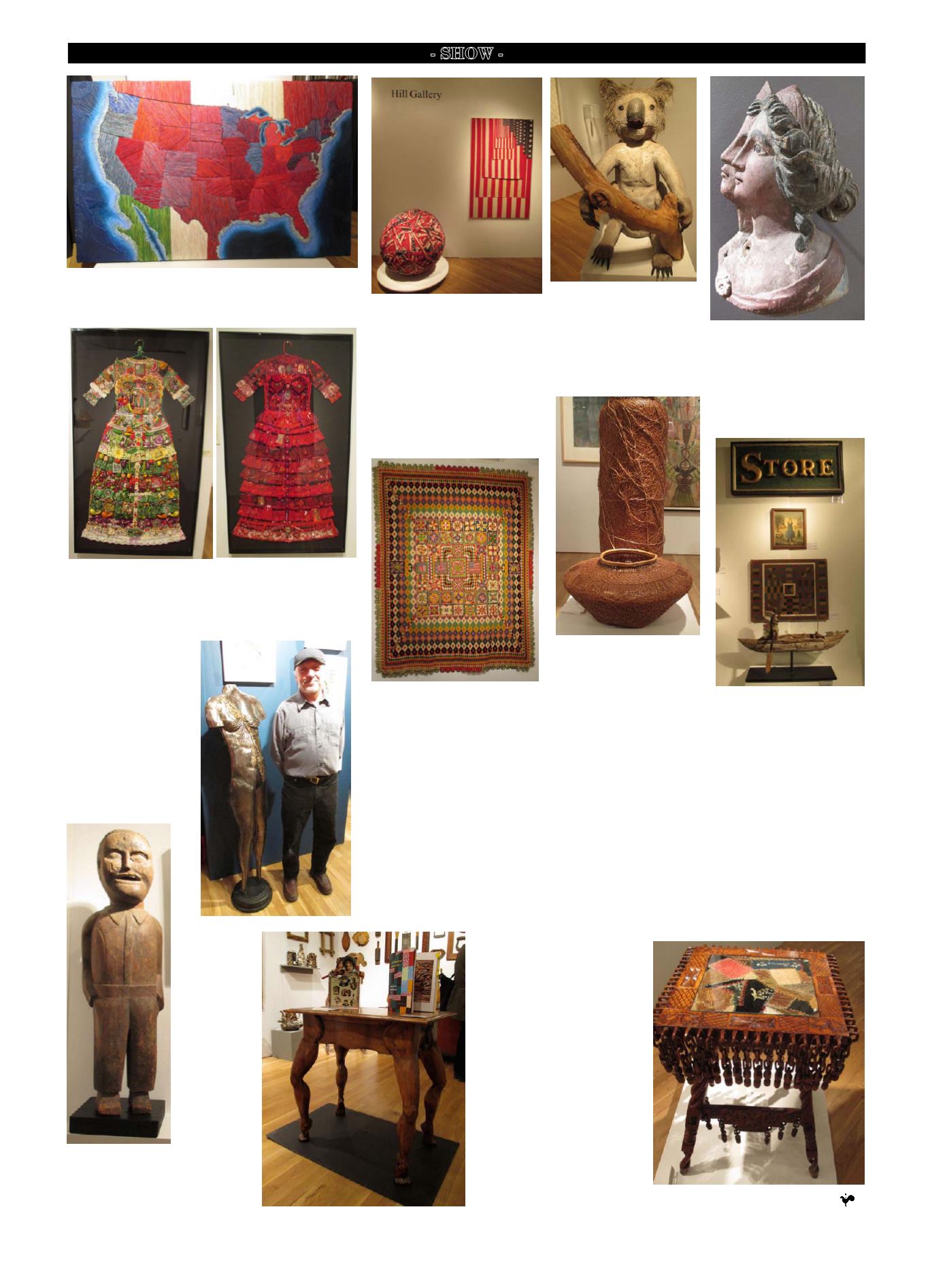

14-D Maine Antique Digest, April 2015
- SHOW -
These two works by Jane Lund,
Garden Dress
and
Red Dress
, were
shown at the booth of Forum Gallery, New York City. Lund, a
well-regarded pastel artist now in her mid-70s, does these assem-
blages of collected objects to take a break from the intensity of pas-
tel drawing. It takes her about a year and a half to make a dress.
The dealer asked $28,000 for each.
The booth of Bonnie Grossman of TheAmes Gallery, Berke-
ley, California, had a theme, “Home Is Where the Art Is,”
and was well attended. Grossman offered this hand-carved
“Male-Female” table by James Cal-
lahan, 1978, for $19,500. On top is
a box made from old tobacco cards
from the 1800s by Julie Haas, tagged
$2200, and a new book by Roderick
Kiracofe,
Unconventional & Unex-
pected: American Quilts below the
Radar, 1950-2000
.
Hill Gallery, Birmingham, Michigan,
offered this
Flag Ball #2
by Donald
Lipski (b. 1947), made in 1990 of mus-
lin, 32" diameter, in an edition of 30,
for $18,000. On the wall is a parade
flag salesman’s sampler of 48-star
linen flags from the 1920s to ’30s,
55" x 36" overall. The gallery asked
$12,500 for it. Hill Gallery also dis-
played works by Detroit photographer
Bill Rauhauser (b. 1918).
Clifford A. Wallach of Manalapan,
New Jersey, a dealer who specializes
in tramp art, offered this whimsy
table with a quilt top by Carrie and
Albert Adams, Wisconsin, 1941. It is
embellished with 90 chains of acorns
and incised doves and stars carved
from single pieces of wood. It was
priced at $12,700. His sales included
a whimsical bird tree carving and a
starburst frame, both by Angie Dow
of Ellsworth, Maine, as well as a
mirror.
This nautical carving of two women
from the mid-19th century is report-
edly from the sailing ship
Two Sis-
ters
, according to Ricco/Maresca
Gallery, New York City. The deal-
ers asked $18,000 for the carving in
wood with original paint.
Cavin-Morris Gallery, New York
City, displayed these baskets
made of cedar bark and root and
bear grass by Native American
artist Dawn Walden, who identi-
fies with the Ojibway tribe. In the
front is
Ebb and Flow I
, 2014, 15"
x 24" x 24". The other,
Random
Order
, 2014, is 35" x 16" x 16".
Each was priced at $4000. Ran-
dall Morris organized the series
of lectures given at Metro Curates
with show director Caroline
Kerrigan Lerch. He also gave a
presentation
on
self-taught
artists.
“Red and Blue States,” a handwoven textile with embroidery and
collage over a map, was available from Bodell.Fahey/Umbrella
Arts, New York City. The artist, Ruben Marroquin, attended the
show. The gallery asked $7500 for the 32" x 50" map.
Mark Kindschi posed with
his steel sculpture
Tattoo
in John Molloy Gallery’s
booth. The New York City
gallery has gone in a new
direction,
incorporating
contemporary art into its
19th-century Native Ameri-
can art collection. Kindschi
lives in Harborside, Maine.
Several of his pieces were
displayed in the gallery’s
booth.
This folk art
figure of a
young man
with hands
in his pockets
was found in
K e n t u c k y,
said dealer Steven S. Powers of Brook-
lyn, New York, who shared a booth
with Joshua Lowenfels of Manhattan,
New York. Powers asked $14,000 for
the circa 1890 wood and paint 24½" tall
figure.
Koala Bear
, of carved and
painted cottonwood and pine,
was made in 1976 by Felipe B.
Archuleta. Hill Gallery asked
$18,500 for the 36" x 19" x 19"
sculpture.
Leatherwood Antiques, Sandwich,
Massachusetts, had a theme of
“Whimsy and Wonder.” Seen here
is a wall filled with just that. On
the top is a 17¾" x 37½" x 2¼"
early 1900s American “Store”
shop sign with raised letters on a
raised green gravel surface, tagged
$1900. A game board with white
borders and worn surface, 19½"
x 25", early 19th century, was
$2500. The 12" x 10" oil on board
of a young girl by Martha Cahoon
(1905-1999) was $2500, and the
Indian in a canoe whirligig, Amer-
ican, early 20th century, 12" x 31",
was $4800.
Laura Fisher of Fisher Heritage,
New York City, displayed a sail-
or’s intarsia quilt with ports of call,
compasses, all four seasons around
the border, and flowers made from
punched-out buttonholes from uni-
forms. She explained that quilting
was occupational therapy for hos-
pitalized military men. This English
early 20th-century 90" x 70" quilt
came from a California collection.
Fisher, who sold hooked rugs and
framed needlework at the show,
asked $40,000 for it. Not shown, an
83" square Diamond in a Square
postage stamp pieced quilt from Indi-
ana, circa 1920, was $25,000.










